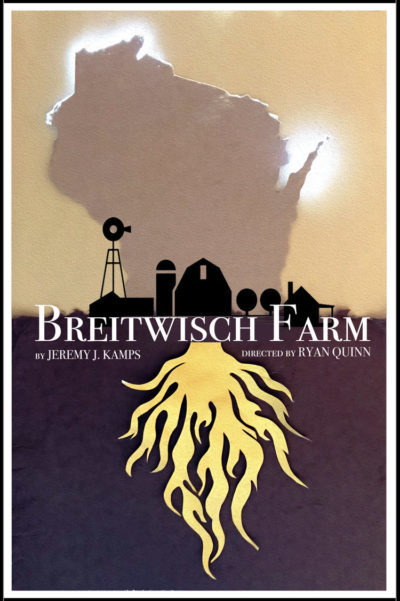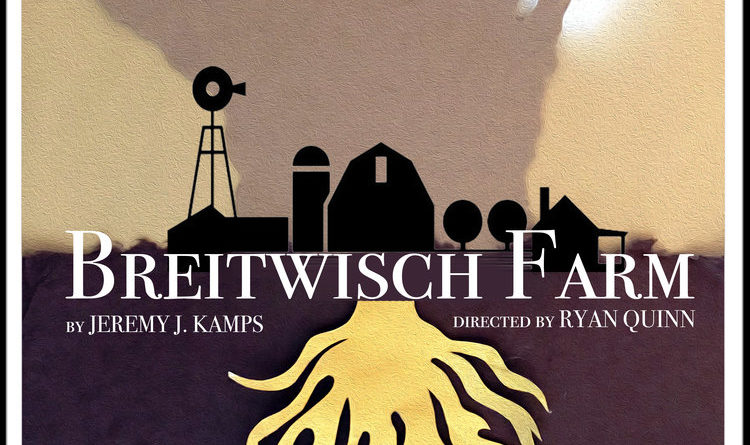INTERVIEW: Welcome to ‘Breitwisch Farm’

Jeremy J. Kamps’ new play, Breitwisch Farm, is inspired by Anton Chekhov’s The Cherry Orchard, but much of is content is informed by the tumultuous politics of the modern day. Set in the swing state of Wisconsin, the show features many headline-grabbing issues, including Tea Partiers, the “Dreamers” and fracking. The playwright throws in some organic farming and the Green Bay Packers for good measure.
The play, running through March 17 at Town Stages in New York City, comes courtesy of the Esperance Theater Company, which strives for renewal and intimate storytelling in its theatrical projects. One of the founders of the company, Ryan Quinn, directs Breitwisch Farm.
Recently, Hollywood Soapbox exchanged emails with Kamps about the new play. Questions and answers have been slightly edited for style.
How influential have Anton Chekhov and his plays been on your career and inspiration for this play?
I grew up in rural Wisconsin, but we were only a few hours from Chicago, Minneapolis and an hour from Milwaukee. When I was 14 years old, my parents took me to see A Raisin in the Sun, Fences and The Seagull. On the drive back from the Guthrie Theater, I started writing my first play.
I think those voices of Chekhov, [August] Wilson and [Lorraine] Hansberry catching me at that formative moment has always stayed with me and how I write. I was forever marked by the evocative feeling and the staggering, revelatory truths told in their stories, but also the way they handled matters of social justice and subtly, seamlessly interrogated where the personal and the political coalesce and collide.
Specifically with Chekhov, I always admired and aspired to stories where humor and humanity are always at play.
How was the rehearsal process? Were you very involved?
The rehearsal process was a dream. Ryan Quinn (the director) and I have a friendship that goes back over 20 years. We were in college together where we co-directed and co-produced, and now to do it at this stage in our lives, at this point in our artistic paths is an incomparable treasure in my life.
Our hearts and brains overlap so in some ways. I just wanted to get out of the way and let his brilliance and vision illuminate the play. We had heard the play and discussed in detail about a half dozen times in the past four years. In fact, when I finally got a draft that was cohesive, we read it in my living room four years ago this month. This ongoing dialogue, lifelong relationship and shared vision of what it means to collaborate, make art and build community made rehearsal process an idyllic experience. Add in the wondrous support, generous spirit and supreme capabilities of the Esperance Theater Company family, and I felt truly loved and blessed throughout.
Katie Hartke and Charlie Murphy drive Esperance to be a company that’s day-to-day is oriented and congruent with its vision. That is not to be underestimated. The dedication is beyond what I could imagine. Every part of this production team was all-heart, all-in and owned this story as their own. That is what we do this for.
Watching the actors develop their roles, I sit back and stop taking notes, turn off my ‘writer eye’ and have been lost in their work. Though the play is not autobiographical in any literal sense per the characters’ lives, its essence and its place are autobiographical, and every character holds a piece of me, people I love and people who shaped me. The actors transport me in a way I haven’t experienced before.
The key word to sum up our whole process is trust. In rewrites in particular, the discussion about what to cut, what to change and why was so heartfelt, so genuine, so protective not only of the characters, but also the whole story, not only of the role, but of each other as people.
Has the show changed a lot from the original draft to what audiences will see on stage?
The characters are the same. The plot is the same. The essence of the story is the same. The place is the same. I think what happened over the course of our development is we refined the play. We deepened the story. The truths of the characters became clearer. It also became shorter (I write the whole story before I find the play, so there was a lot to cut). But I could only find what to cut after I wrote all I could see in this world.
The play spans one year, four seasons, and so a lot of the story happens in the spaces in between. Figuring out how to make that clear without expositional took a lot of trial and error. I did most of the writing in 2011 and 2012 with a major re-write in 2014 and smaller revisions with each of our reading/workshops.
The play is set in 2010-2011, and what I have found is that the times have changed. Though it is only seven years ago, the first term of the Obama era seems like looking into our history. It’s close enough time that we can all reach out and touch it, but time is not measured in months and years but in the rate of change. We are in [a] long period of upheaval, and so it almost feels long ago watching it now.
That said, the issues are exactly the same, just new incantations. The play is set pre-DACA [Deferred Action for Childhood Arrivals], at the height of the Tea Party movement, the rise of the Koch Brothers, before deportations and ICE [Immigration and Customs Enforcement] were common lingo.
Still today the play poses the question of what is community in a time of partisanship? What is the USA? How do we value each other’s humanity in the global community?
When did you realize you wanted to be a playwright?
I have three sisters all nearly ten years older than me. When I was about 2 years old, they entertained themselves by forcing me to make up stories which they would transcribe, so I had an automatic audience and was immediately published (on looseleaf paper taped to the fridge). From then and there I loved engaging with the world, beyond what is known to me, to understand the story of the world, then traveling deep within to make that story and understand the story of myself in relation to the world.
What makes playwright and dramatic story so wondrous is that final step brings it back to life. We get to share our work as an experience. We get to collaborate and find community in the process of making our art, shaping our stories.
By John Soltes / Publisher / John@HollywoodSoapbox.com
Breitwisch Farm by Jeremy J. Kamps is currently playing through March 17 at Town Stages in New York City. Click here for more information and tickets for the Esperance Theater Company production.

